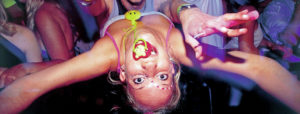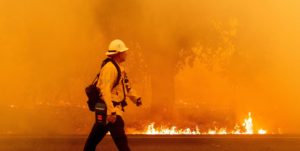Chris McCandless had been dead for two weeks when a pair of hunters stumbled upon the abandoned bus he had been using as a makeshift shelter near Alaska’s Denali National Park. A note taped to its door read:
ATTENTION POSSIBLE VISITORS.
S.O.S.
I NEED YOUR HELP. I AM INJURED, NEAR DEATH, AND TOO WEAK TO HIKE OUT OF HERE. I AM ALL ALONE, THIS IS NO JOKE. IN THE NAME OF GOD, PLEASE REMAIN TO SAVE ME. I AM OUT COLLECTING BERRIES CLOSE BY AND SHALL RETURN THIS EVENING. THANK YOU,
CHRIS MCCANDLESS
McCandless had starved to death. His corpse, partially decomposed and huddled in a sleeping bag, weighed less than 70 pounds.
At the time, 30 years ago this week, McCandless’s story became the object of fascination — and not long after that, backlash. His life was either an inspiring example of indomitable American spirit or a nauseating waste of privilege and opportunity; his death was either a tragic accident or an idiotic, avoidable bit of foolishness. The debate surrounding Chris McCandless’s place in the national narrative was itself a sort of American tradition: for as long as this country has romanticised its wayward sons, there have also always been people eager to poke holes in the stories we tell about these men, or in the ones they attempt to tell about themselves.
Henry David Thoreau, the original society-escaper who sought a deliberate life in the forest, was savaged posthumously in 1865 by James Lowell Russell, who suggested that the author of Walden was nothing more than a late-coming poseur to the life for which he became famous: “Till he built his Walden shanty, he did not know that the hickory grew in Concord. Till he went to Maine, he had never seen phosphorescent wood, a phenomenon early familiar to most country boys. At 40 he speaks of the ceiling of the pine as a new discovery, though one should have thought that its gold-dust of blowing pollen might have earlier drawn his eye. Neither his attention nor his genius was of the spontaneous kind. He discovered nothing.”
This sentiment survived to be reprised, more succinctly, in the words of one 21st-century Tumblr user: “Just a quick reminder that Thoreau’s mother did his laundry for him and that Christopher McCandless starved to death.” The lumping-together of McCandless with Thoreau was inevitable, and not just because the latter was a major inspiration for the former: here was an expression of the timeless desire to take these icons of male self-sufficiency down a peg. Today, the mention of either man tends to elicit a snarl — but the bulk of the anger is saved for McCandless, fuelled by a contemporary media ecosystem that keeps finding new ways to tell his story.
John Krakauer’s 1993 book Into the Wild — and the 2007 film based on it — were accompanied by fierce debates over the foolishness of McCandless’s Alaskan venture, the insufficiency of his survival skills, the lethality of his ignorance. The most scathing criticism came from Alaskan citizens who suggested that this story revealed nothing about the difficulties of surviving in the wild and everything about the idiocy of its protagonist, who was not only woefully unprepared for his trip but couldn’t even tell a moose from a caribou. (Side note: He could, actually.)
But lately, the controversy surrounding McCandless as a mythological figure is no longer an accompaniment to the story; it is the story. On the 15th anniversary of McCandless’s death, Men’s Journal published a story titled “The Cult of Chris McCandless”, an examination of the young man’s legacy in and around the wilderness in which he perished. One gets the sense that there’s still little sympathy amongst Alaskans for McCandless’s death, and the quotes from locals range from pitying to contemptuous. (One local guide sneers: “We’re hard up for heroes if that’s what it takes — some guy who starved to death in a bus.”)
There’s also the matter of the bus itself, which was removed from its wilderness location to the Museum of the North after too many Into the Wild stans managed to injure or kill themselves attempting to visit it. And when McCandless’s sister released a memoir, The Wild Truth, in 2014, revealing that her brother had been fleeing not only the pressures of conventional society but a hellish home life ruled over by their controlling, abusive father, it was received less as additional context to his story than a debunking of it: McCandless wasn’t a latter-day adventurer, he was a spoiled trust-fund kid with daddy issues.
Today, the controversy that swirls around McCandless is less about the man himself than about how he’s remembered, and by whom. To even see his story as heroic is increasingly difficult; the iconic, romantic image of the pioneer going his own way, riding the rails in search of adventure or retreating to the forest to live off the land, has been overtaken in the contemporary consciousness by the fearful spectre of Men Going Their Own Way . In 2022, the independence and self-sufficiency required to live outside society’s margins just seems weird, and maybe a little bit threatening, especially to the apartment-dwelling urbanites who cluster around the knowledge economy and drive the national discourse (their brief, failed pandemic-era forays into country living notwithstanding).
. In 2022, the independence and self-sufficiency required to live outside society’s margins just seems weird, and maybe a little bit threatening, especially to the apartment-dwelling urbanites who cluster around the knowledge economy and drive the national discourse (their brief, failed pandemic-era forays into country living notwithstanding).
The guy who hunts his own food, chops his own wood, and builds his own home, is a suspicious character: a little too trad, a little too in-your-face masculine, probably a Trump voter. And the guy a step beyond that, the one who doesn’t just paint outside the lines but wants to buck the system entirely? There’s something really wrong with him. He’s no pioneer; he’s a misanthrope, a deadbeat, an incel. He’s the Unabomber — or the Joker. And in a world where so much of life is, or can be, lived online, he’s dangerous. The unhappy young man who wants to turn his back on society seems just as likely to turn on it, snarling, weapon in hand. We’re afraid of men like this, and we’re afraid of the people who admire them.
In the years since the publication of Into the Wild, John Krakauer has advanced several theories about McCandless’s cause of death, all of which were met with interest but also eagerly debunked by those invested in recasting McCandless as a feckless idiot. However, by the time Krakauer discovered the most conclusive evidence yet that the potato seeds McCandless had been subsisting on contained a little-known amino acid that can cause paralysis and death, the desire to knock McCandless out of his position in the pantheon of American trailblazers had superseded any interest in the truth about his life, and death. Krakauer, writing in The New Yorker in 2013, seemed to understand that this ship had sailed: the new information, he wrote, “is unlikely to persuade many Alaskans to regard McCandless in a more sympathetic light, but it may prevent other backcountry foragers from accidentally poisoning themselves”.
What Krakauer didn’t mention is that another man following in McCandless’s footsteps — accidentally or otherwise — is equally unlikely. The story of McCandless’s retreat from society and subsequent death in the wilderness is singular, the stuff of American legend. It is also, in all likelihood, the last of its kind. In the 30 years since McCandless abandoned most of his worldly possessions and embarked on a new, unmoored life as a modern-day vagabond, the twin marches of development and technology have made it far more difficult to get lost, disconnect, disappear. There are fewer uncharted paths to take, fewer places to hide from the ubiquitous reach of surveillance cameras, satellites, or cell phone towers reaching out to ping the device in your pocket.
But more than that, the space we used to hold as a society for people who wanted to live outside it — young men driven into the wilderness by boredom, desire, derangement, or an unquenchable thirst to test their own limits — is vanishing too. McCandless wanted to escape: from society, from obligation, from the shackles of pretence and politeness and convention that keep us at a distance from the animal inside. One of his favourite quotes from Thoreau was about the emptiness of modern life: “Rather than love, than money, than fame, give me truth. I sat at a table where were rich food and wine in abundance, an obsequious attendance, but sincerity and truth were not; and I went away hungry from the inhospitable board. The hospitality was as cold as the ices.”
In the digital age, that desire to escape — to live deliberately — has evolved and split into a series of disparate threads. The notion of eschewing money, fame, and love in order to live truthfully feels especially paradoxical in the age of social media and remote work, where young people — and young women, particularly — can live the footloose and unfettered life of a nomad with relative ease and in the public eye. Instead of solitary vagabonds roaming the world unnoticed, we have the attention economy and its #vanlife influencers, broadcasting their adventures to a rapt audience of millions. They’re not looking for truth; they’re looking for sponsors.
What would today’s world make of a young man like McCandless — and what he would make of it? Perhaps, with his tendency toward grandiosity and self-mythologising, he would have amassed a following in his quest to flee from convention. Perhaps the quotes he scribbled in his journal would have been repurposed as Instagram captions: “Two years he walks the Earth. No phone, no pool, no pets, no cigarettes. Ultimate freedom. An extremist. An aesthetic voyager whose home is the road.”
Or perhaps, with the internet at his fingertips, his frustration at the insincerity of most people — and the anger stemming from his abusive upbringing — would have driven him down a rabbit hole and into the arms of some online community or another. The MRAs. The DSA. The Men Going Their Own Way, turning their backs on society together.
What seems clear is that the path he did walk — into the wild, alone, without fanfare or even saying goodbye — has all but vanished from the landscape. And while there are reasons why this is a good thing (it is much harder to disappear and starve to death in the wilderness than it used to be), there is also something lost in the way that 21st-century life makes it so impossible for us to get lost, to be alone, to turn away from all the chirping, beeping, blinking things that demand our attention every hour of every day. Most of us can’t bear to sit quietly with our thoughts for five minutes, let alone months on end. Most of us have neither the desire nor the knowledge to stay alive without a sprawling safety net of modern conveniences. And far from seeing McCandless as a hero or a legend, an adventurous spirit with good intentions who met an unfortunate end, too many of us have lost the ability to see the value in his journey at all.
Disclaimer
Some of the posts we share are controversial and we do not necessarily agree with them in the whole extend. Sometimes we agree with the content or part of it but we do not agree with the narration or language. Nevertheless we find them somehow interesting, valuable and/or informative or we share them, because we strongly believe in freedom of speech, free press and journalism. We strongly encourage you to have a critical approach to all the content, do your own research and analysis to build your own opinion.
We would be glad to have your feedback.
Source: UnHerd Read the original article here: https://unherd.com/




